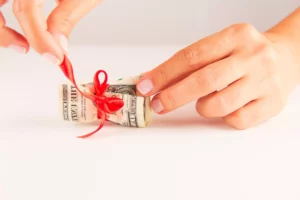I’ve written a few books about money. In each, I’ve included a chapter or two about consumer debt: credit cards, car loans, installment plans, that type of thing. Consumer debt is the money you owe for things that go down in value once you purchase them. My writings on this kind of debt have always taken the same tone: why it’s a bad thing, and how to avoid it.
I’m tired of that negative approach. So this time, I’m going to be positive about this subject: This article is about how to get into debt. Not just a little debt. A great heaping load of consumer debt. Enough to wallow in.
It’s not as easy as it seems. To positively bury yourself in debt, you’ve got to recklessly disregard a few universal principles of nature and arithmetic, and replace them with a new set of principles that may seem silly at first, but will become believable if you practice them enough. Here are your new principles. Repeat daily till you see results.
1. Debt is unavoidable
If you try really, really hard, you can convince yourself that debt is not a choice you make. Sure, you sign the agreement, charge more than you have, or decide not to pay a bill in full — but what choice do you really have? You can’t possibly live through today without borrowing from tomorrow’s wages. Don’t worry, it’s not your fault. It’s because you don’t get paid enough … or because prices are too high … or maybe it’s the economy. It doesn’t matter what you blame it on. Just pick something that takes the burden of financial responsibility out of your hands.
2. Debt teaches responsibility
If debt is inevitable, then it sure would be great if some good came out of it. As it turns out something good does happen … if you can swallow this second principle. At first glance, it’s laughable: In most cases, consumer debt reveals irresponsibility. Borrowing on tomorrow to pay for today usually comes down to bad planning or poor self-control. But with some creative mental juggling, you can convince yourself otherwise. After all, it requires a certain level of responsibility to make regular monthly payments on a high-interest loan. Therefore, you can look at interest payments as the tuition for a course in responsibility. In that light, the debt seems beneficial.
Of course, there are other ways to learn responsibility, such as staying sober, performing well in school, maintaining sexual purity, tithing to your church, sending monthly support checks to a missionary. These activities teach and demonstrate greater responsibility than debt-repayment. But they’re more work and not nearly as impressive as a new car, so try not to think about them.
3. Debt is safe
This one’s easy because it follows the same tried and true path of reasoning as the principle of “safe sex.” Say it with me: Sex is unavoidable. Therefore, if I practice responsibility in sex (i.e., use a condom), it’s SAFE. Now let’s swap the subjects and try it again: Debt is unavoidable. Therefore, if I practice responsibility (i.e., make all my payments), it’s SAFE. See how easy this is?
Warning: If you’re serious about getting into debt, accept this reasoning at face value and move on. Don’t hunt for the flaws. Don’t think about the fact that the principle of “safe sex” presumes that sex is just a physical thing. Because if you acknowledge the truth — that sex is a social and emotional and spiritual thing too — the principle unravels: They don’t make condoms to protect these other body parts.
The “safe debt” principle falls apart for the same reason: Debt isn’t just a financial thing. It changes your priorities, affects your self-image. It sells off hours and days in your future (that’s the real source of the money you borrow) — a future already purchased by God, who may have other plans for your time. And when you get something before you’re earned the right to own it, it’s like collecting the prize before the race is won … or sleeping with your fiancee the night before your wedding … or something like that.
So don’t dwell on these things. Just think of debt as a financial issue. It’s unavoidable. Play responsibly. Keep it safe.
4. Debt is smart
To master this principle, you’ll have to disregard some basic rules of arithmetic. Specifically, percentages. Let’s say you have a bank savings account paying you 5% interest. Let’s also say that you have a credit card from the same bank, and you’re paying them 18% interest on the balance you owe. Any sharp fifth grader will ask you why you’re paying what amounts to 13% interest for the privilege of borrowing your own money. Fifth graders ask these kinds of questions to show off what they’re learning in school, and, well … because they’re nosy.
When you can recite this principle with a straight face, you’ll be able to give that little show-off a convincing answer: “The credit card debt is for things I need now. The money in the savings account is for the future.” That ought to shut him up.
As with the other debt-inducing principles, this one gets shaky on close examination: Any debt is a mortgage on your future. (To test that theory, tell the bank you have just six months to live, then ask for a loan.) When you borrow money, you’re basically just getting an advance on future paychecks. When those paychecks do arrive, a portion will already be committed to pay for things in your past. If what’s left isn’t enough to cover you, you’ll have to reach into the future again, borrowing money on another batch of paychecks. This is what’s called debt dependence. It’s just like a drug addiction, except that drugs are cheaper.
You can see the result here. The fifth grader’s right: You’re earning 5% on the money you’re saving for the future. And when the future comes, you’ll get to use that savings to help make 18% interest payments on debts you ran up today. If you think about that one for a bit, it’ll make sense. So don’t think about it. Keep thinking that what you’re doing is smarter, even if it defies the rules of arithmetic. And stop talking to fifth graders.
More Wallowing Tips
If you can wrap your mind around these principles, you’ll have what it takes to get yourself into debt. But staying in debt — and digging the hole ever deeper — takes more than a change in thinking. To positively wallow in consumer debt, you’ll have to take some big action steps:
Apply for every credit card you can. Many banks will issue cards even when you’ve already got several accounts and a spotty credit record. Some issuers don’t check very hard: Their interest rates are so high that they can afford the risk of accepting a few bad accounts. Other issuers work with old credit information: They may not know that you’ve applied for three new cards in the last month, or that you ran up $2000 on your cards on a spring break in Jamaica. If you’re lucky, you can get several cards with a combined credit limit equal to two years’ salary. Your friends will be impressed.
Flip out on fees. It’s no big deal if you just pay the minimum balance on the credit card. Sure, you’ll pay outrageous interest on the old balance and any new purchase (there’s no grace period when the account shows a balance), but if you keep making these minimum payments, you’ll eventually pay off the debt. To take full advantage of your credit card’s ability to bury you, rack up as many additional fees and penalties as you can. Max out your credit limit so you’ll get hit with those over-the-limit charges. Then make lots of late payments, and bounce a check or two. These fees just get added to your balance, so you’ll get to pay interest on them too. If you play these cards right, you can wind up paying compound interest. For running up debt, nothing beats owing interest on your interest.
Go for cash. The beauty of cash advances is that they start incurring interest the moment you make them. And bonus, that interest is typically higher than what you pay on regular charges. So get rid of your ATM card and use credit cards for drawing cash. Now you have room in your wallet for another credit card.
Get addicted to that new-car smell. Credit cards can bury you only so far. To plumb the depths of debt’s hole, get a car loan. A new car can drop 20% in value the moment you drive it off the lot. Your first year’s payments wind up paying for that delicious new-car smell. Sure, you could pay cash for a good used car and have money left over for a case of 99 cent air fresheners, but where’s the fun in that? Besides, you can afford the new car because you’re getting a good job. (It’s a half hour away…which is why you need the car…which is why you need the job. But don’t think about that. It’ll make your head hurt.) One problem: The dealership is offering you 0.9% financing. If debt’s your goal, that’s not good. Actually, you’re still okay: The dealer fiddled with the price till it’s equivalent to what you’d be paying in normal interest. (They’re not stupid — they get your money either way.)
Full Disclosure
The above principles and tips really work. I know because I tested them myself. I got myself into serious, debilitating, depressing debt, and spent most of this decade digging out. I didn’t try to get into debt, but I got there just as surely as if I had made debt my goal. I admit that I was an extreme case: I got in deeper than anyone I know. And unlike many people, I chose not to declare bankruptcy. As awful as I felt, I knew it would be worse to live with the knowledge that I had walked away from my responsibilities. I’ve done that enough in non-financial ways.
You don’t have to hit rock bottom to discover the truth about consumer debt. It has many attractive qualities and often seems like the wise or only choice. But it demands one thing of us that Christians cannot give: our future. When you borrow money to pay for something that goes down in value, you’re promising to work a certain number of hours over the next several months or years to pay for something you want today.
But what if God has other plans for you? You (or your heirs) cannot sell the thing you bought for enough money to pay off the debt. Someone’s stuck holding the bill. Many times that Someone is God. He calls people to serve Him, but they can’t take the call because they’re working to pay off the past. (He already paid our biggest debt; we have no business running up new ones.)
Maybe God will call you into full-time ministry, or to teach in the inner city, or go on a mission, or become a stay-at-home parent. Or maybe He has plans for a portion of your paycheck to serve Him in other ways. It’s dangerous to sell off a portion of a future that you don’t really own. Jesus tells the story of such a speculator: “You fool! This very night your life will be demanded from you. Then who will get what you have prepared for yourself?” (Luke 12:20)
Of course, actually doing what God calls us to do is dangerous too. But that’s the kind of adventure we signed on for when we accepted His Son’s big debt payment. When He calls, will you have to stay behind to pay off the bills? Or will you be ready to go, with your financial calendar cleared for whatever He’s got planned?
Next month I’ll help you get ready. We’ll cover simple techniques for avoiding debt, as well as some neat tricks for climbing out of it. It will help if, over the holidays, you practice some financial restraint (except in your gifts to me, of course). And while you’re at it, consider making a serious resolution to get out of debt in the new year. I’ll help you fulfill that promise.
Copyright © 1998 Todd Temple. All rights reserved. International copyright secured.










